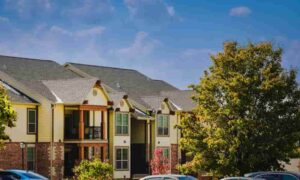Housing Assistance For Stroke Victims: Empowering Recovery
Over 8,00,000 people experience a stroke every year in the United States, and having housing assistance for stroke victims sustains mobility and financial challenges. A supportive housing environment can provide a safe space where potential hazards can be reduced.
In a typical home setting, stroke survivors have a higher risk of falls and other incidents. The proper housing facilities may reduce their risk of getting stuck and provide safety and security.
How to Get Housing Assistance For Stroke Victims?
There are various resources to get the benefits for your emergency housing or shelter requirement. Get enrolled in one of the Government Assistance For Stroke Victims Programs and receive monthly benefits and rental support from the federal administration.

The stroke can impact the cognitive aspect of the person and may damage memory, attention, perception, and other brain functions. Well-equipped housing can significantly contribute to the emotional strength of stroke survivors.
Affordable housing or financial assistance for stroke victims can relieve the economic strain caused by expensive medical billing and other expenditures post-stroke recovery period.
Better housing means reduced mobility challenges for stroke survivors and proximity to nearby healthcare providers and services. Moreover, hiring a caregiver or home health aide to assist with daily tasks and provide medical care can be a viable option.
Modified Personal Home includes the following: adapted facilities with personal care in the housing setup can improve the lifestyle of stroke victims and assist them with their daily activities.
- Wheelchair ramps
- Grab bars in the bathroom.
- Stairlifts or elevators
- Widened doorways
- Non-slip flooring
- Lowered countertops
The temporary housing options available are often called respite care services. It provides regular caregivers with a break from managing the care and facilities of stroke survivors. Respite care can be offered in various settings, from specialized facilities to private homes.
Many government agencies provide housing assistance for stroke victims with dedicated programs available to particular states or regions. Mainly, they’re designed to assist people with disabilities, including stroke survivors.
- The Department of Housing and Urban Development (HUD)
- Medicaid
- Social Security Disability Insurance (SSDI)
- Supplemental Security Income (SSI)
Contact your local housing authority to inquire about available housing options, assisted living for young stroke victims, residential subsidies, and other ongoing specialized housing programs or initiatives for individuals with disabilities.
You can get here the 7 Top-Notch Gifts For Stroke Victims and explore the new ideas that can cultivate the essence of presenting meaningfulness to these stroke survivors.
Community-based service waiver schemes can also help to cover the cost of housing modifications and help you make your home more accessible or provide support for in-home care while removing mobility issues.
Find Housing Assistance For Stroke Victims
There are many private and non-profit organizations helping stroke victims to accommodate their survival needs, including housing facilities, food supplies, medical assistance, education, and more. Here, you can find places where you can get the housing support.
1. American Stroke Association (ASA)
- One division of the American Heart Association (AHA), with the sole focus on improving the lives of stroke survivors, this organization can assist with housing and shelter facilities, food outreach programs, and medical assistance to the victims.
- The ASA provides a wealth of information on stroke prevention and cure, recognizing the symptoms of a stroke, and how to rescue in such conditions. The programs offered are often inclined toward helping the healthcare professionals and people of the state. They help to handle critical health conditions during a stroke.
2. Habitat for Humanity
- Under their “hand-up, not a handout” initiative, Habitat for Humanity provides homeownership to eligible families and individuals needing immediate shelter for survival. You can inquire about eligibility and the application process through their local housing affiliates.
- Volunteers drive this non-profit organization and often engage with the housing affiliates, residents, leaders, and housing partners to facilitate housing services and shelters for homeless individuals and low-income families.
3. Rebuilding Together
- This non-profit organization deals with local affiliates to address the long-term recovery of those struck by the natural disaster. It also provides housing assistance for stroke victims and other heart-related diseases.
- It’s been active since 1973 with the sole aim of providing emergency assistance to people in need under its various initiatives and programs, such as free shelters for people experiencing homelessness, food provision, clothing assistance, and accessible housing facilities. It provides energy-efficient upgrades that can help them reduce utility costs and improve environmental sustainability.
4. United Way
- Based on the local requirements, you can get assisted living for young stroke victims through the housing initiative under the United Way organization. You can also utilize their referrals to obtain the proper shelter during your emergency.
- Contact your local United Way office on their given helpline by dialing 211 to inquire about available housing allocation services for low-income and homeless individuals and get the other resources nearby your area.
You can visit the Eldercare Locator for the latest information regarding the housing opening near your location or residential region. It can effectively help you find the nearest center to contact in an emergency.
Free Money From Government: Housing Help For Stroke Victims
Maintaining the budget is difficult, especially when you’re disabled with no job and have out-of-wallet expenses for your medical treatment. The government provides free money for stroke victims, which we shall discuss here.

Find the free stuff for stroke victims from various sources and ensure the benefits are given to you by the federal and non-federal organizations and ASA initiatives, including the health insurance providers.
You can check on the following programs offered by the Government in the United States that are recommended for housing help for stroke victims.
- Social Security Disability Benefits
- Social Security Disability Insurance (SSDI)
- Supplemental Security Income (SSI)
- Medicaid
- Home and Community-Based Services (HCBS) Waivers
- Department of Housing and Urban Development (HUD)
- Section 811 Supportive Housing for Persons with Disabilities
- Housing Choice Voucher Program (Section 8)
- Veterans Affairs (VA)
- Specially Adapted Housing (SAH) Grant
- USDA Rural Development
- Single Family Housing Repair Loans and Grants
- Low-Income Home Energy Assistance Program (LIHEAP)
- Area Agencies on Aging (AAA)
- State and Local Program
- State Housing Finance Agencies
- Local Housing Authorities
- Legal Aid and Advocacy
- Center for Independent Living (CIL)
While we understand the expenditure required during the recovery from stroke and having the best medical treatment for the stroke incident, you can now benefit by enrolling in one of the 12 Free Money For Stroke Victims Programs that can ease your financial burden.
Legal aid services or disability rights organizations can also guide you with the rights and entitlements and help you advocate for homeless shelters, suitable housing facilities, and accommodations for stroke victims.
Conclusion
In this article, we comprehensively covered housing assistance for stroke victims and the places where you can receive the benefits. We have also highlighted the free money from the government for stroke survivors.
FAQs
Here, you can learn about your quick answers to frequently asked questions and resolve your queries immediately.
What benefits are there for stroke victims?
If you cannot work for at least 12 months after the stroke, you can claim Social Security disability benefits.
Is there money to help after a stroke?
Luckily, there’s help for stroke patients dealing with the bills and expenses of stroke recovery. Help Hope Live is your resource for community-based fundraising to assist with the unmet medical fees and related costs that can result from having a stroke.
Is stroke a total permanent disability?
Strokes can lead to short-term and long-term cognitive and physical impairments. Even with extensive treatment, a stroke can leave a person with a permanent disability.
Can stroke recovery last a lifetime?
Recovery time after a stroke differs for everyone—it can take weeks, months, or even years. Some people recover fully, but others have long-term or lifelong disabilities.
Can a stroke patient live at home?
Most stroke survivors can return home and resume many activities they did before the stroke. However, they can even enter the rehabilitation center if required based on their health conditions.
What accommodations are available for stroke survivors?
There are several ways through which they can get accommodation, such as Bath Chairs, Canes, Crutches, Grab Bars – Toilet Hinged Arm Support, Personal Safety and Fall Alert Devices, Stair Lifts, Swing Away Grab Bars, and Toileting Aids.



